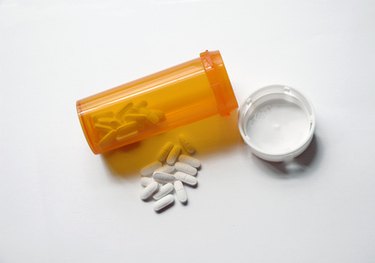
According to the American Heart Association, coronary heart disease accounted for one out of every 2.9 deaths in the United States in 2006. The prevalence of obesity, diabetes and high blood pressure have increased among Americans, and statins have become a key tool in the fight against heart disease. While weight loss is considered the best treatment option by clinicians, research dating back to 1980 has shown statin use to be an effective pharmacological treatment for reducing elevated cholesterol in patients.
Statins Defined
Video of the Day
Statins are a class of hydroxymethylglutaryl-coenzyme A (HMG-CoA) reductase inhibitor regulated by the U.S. Food and Drug Administration (FDA). They are indicated for the treatment of several conditions, including high cholesterol, high triglycerides and arteriosclerotic vascular disease. They are also used for the prevention of heart attack and stroke. Seven types of statins have been developed: atorvastatin, fluvastatin, lovastatin, pitavastatin, pravastatin, rosuvastatin and simvastatin. Each has a specific molecular structure, weight and composition, which affects how it is prescribed and used.
Video of the Day
Contraindications and Cautions
Statins are not recommended if you have certain preexisting conditions. Take caution if you are pregnant or breast feeding, have alcohol use disorder, coronary artery disease, liver or kidney impairment, hypothyroidism, hypotension, myopathy, seizures or sepsis; or if you have had surgery, acute infection or trauma. This is not an exhaustive list and only your doctor will know if prescribing statins is appropriate for your treatment plan.
Side Effects and Drug Interactions
Adverse effects are reported in less than 17 percent of patients. The most frequent complaints are headaches, abdominal pain, muscle pain, diarrhea, nausea and vomiting. Dangerous reactions have been reported in patients already taking antihypercholesterolemia medications, immunosuppressants, blood thinners, corticosteroids or antifungal, antiviral or antibacterial drugs or going through chemotherapy. You must inform your physician of all prescription and over-the-counter medications you are currently taking.
Statins and Weight Loss
As of 2010, there are no scientific studies regarding weight loss or weight gain as a side effect of statin use. There is, however, a large body of evidence linking obesity to an increased risk of cardiovascular diseases. Reducing body weight and increasing exercise are first-line treatments for lowering the risk of cardiovascular disease.
Recommended Lifestyle Changes
Physicians recommend all patients participate in regular physical activity and eat a low-fat diet to prevent the need for statin use. Even after statin treatment has begun, saturated fat should be reduced to less than 7 percent of total daily calorie intake and cholesterol should be reduced to less than 200 mg per day. Weight loss is the primary goal of these lifestyle interventions and guidance from specialized, structured support programs may help with long-term success and adherence.